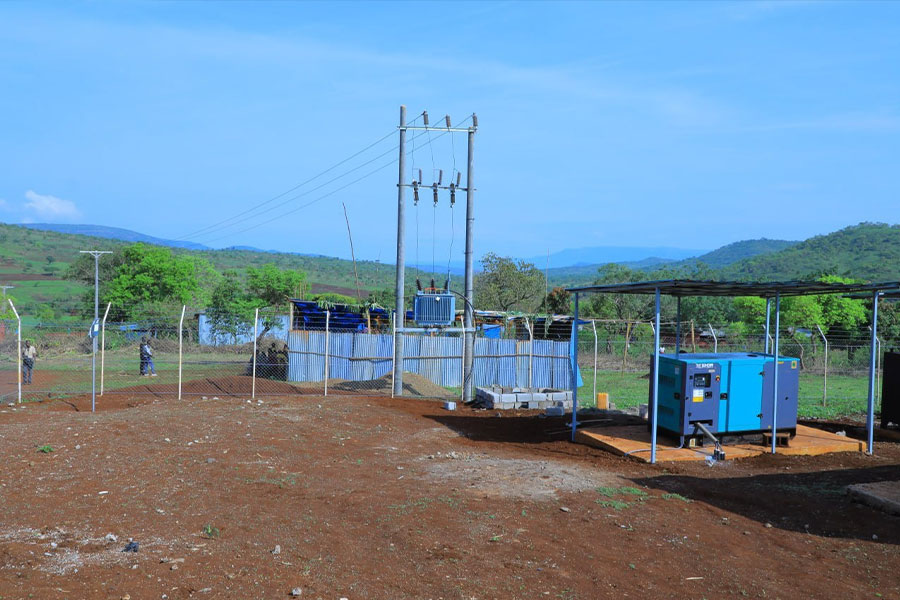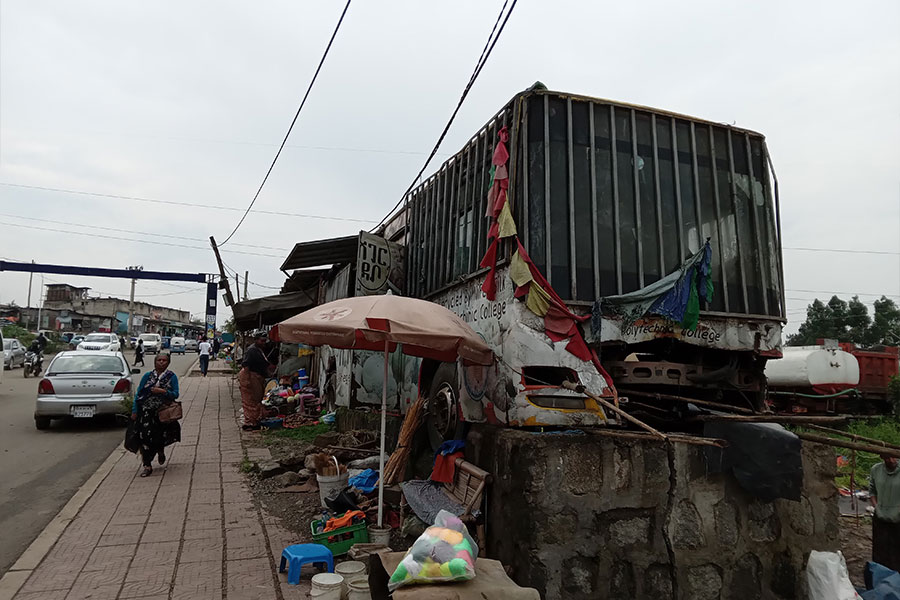
View From Arada | Nov 11,2023
Sep 8 , 2024
By Yuen Yuen Ang
As Western observers debate China's global position, it's crucial to note the country's unique technological boom concurrent with a growth slump. President Xi Jinping's ambitious directives largely drive this divergence - steering the enormous Chinese bureaucracy towards developing a high-tech economy, writes Yuen Yuen Ang, a professor of political economy at Johns Hopkins University, in this commentary provided by Project Syndicate (PS).
Western observers often view China as either a rising superpower on the cusp of global dominance or a fragile country on the brink of collapse. These contradictory takes amplify only one side of China’s economic trajectory: a tech boom alongside a growth slump. This paradox can be attributed largely to the directives issued by President Xi Jinping to the millions of Communist Party apparatchiks tasked with realising his ambitious vision.
Contrary to the perception of China as a command economy where national leaders deliver precise orders, the logic of "directed improvisation" prevails. Central leaders signal their priorities while the country’s vast bureaucracy – comprising ministries and local governments – interprets and acts on these signals according to political incentives.
Xi has made it clear to Chinese officials that he intends his legacy to be a new economy focused on “high-quality development” and "new quality productive forces" (that is, high-tech innovation). The old economy of polluting industries, infrastructure investment, and real-estate speculation helped lift China from poverty to middle-income status, but Xi has distanced himself from it. He even seems to disdain the country’s previous growth model, associating it with the political rivals and corrupt underlings he has sidelined or imprisoned.
Chinese officials thus have little incentive to take bold steps to revive the old economy: success would do little to improve their standing, and failure could end their careers. This helps to explain the central government’s lacklustre response to the ongoing real-estate slump. Had policymakers acted decisively right after the COVID-19 pandemic, they might have restored consumer confidence. By now, however, the economic slowdown has hit not just confidence but also incomes, as more people face layoffs and pay cuts.
The government’s singular focus on producing advanced technology products has driven local authorities to overinvest in sectors favoured by Xi, such as electric vehicles (EVs) and solar panels. In a recent article, my co-authors and I show that after the central government set ambitious targets for new patents – a standard indicator of innovation – local officials inflated the numbers by encouraging junk patents. Consequently, the share of genuinely novel innovations has declined. We refer to this phenomenon as a “low-productivity innovation drive.”
Although China is remarkably effective at quickly generating massive outputs, this approach results in significant waste. The EV industry is a prime example: China has over 450 car factories, yet one-third operate at less than 20pc capacity. Ultimately, most of these producers will likely go bust, leading the industry to consolidate around a few giants like BYD.
Yet there are upsides to this method.
Central leaders are willing to tolerate inefficiency and waste as long as they produce champions in the end. Local governments are pulling every trick out of their bags to foster emerging industries, from combining venture capital with public investment to attracting scientific talent deterred by America’s scrutiny of Asian scientists. Notably, China gained more than 2,400 scientists in 2021, as the United States experienced a net loss.
Essentially, the bureaucracy has adapted the communist practice of “mobilisation” (colloquially known as "bee-hive" campaigns) to serve the leadership’s capitalist objectives. Historically, this strategy targeted consumer-goods exports, enabling households in the Global North to benefit from hyper-competition within China and, thus, cheap Chinese imports. But, it has since been repurposed to promote advanced manufacturing and clean energy – sectors that the US and the European Union (EU) are determined to dominate through industrial policies.
To be sure, even Xi’s harshest critics would not oppose his ambition to shift away from China’s old growth model and foster high-tech innovation. After all, every country aspires to move in this direction. But the old and the new economies are deeply intertwined; if the old economy falters too quickly, it will inevitably hinder the rise of the new. This is already evident in the real-estate meltdown, which has wiped out jobs and household wealth, leading consumers to cut back on spending.
As a result, producers have been forced to export unsold goods like EVs, exacerbating trade tensions with the US and other countries accusing China of dumping its overcapacity into their markets.
Simply put, China’s new economy cannot realistically grow fast enough to replace the old one soon. Compounding this problem are job cuts from technological advances like industrial robots and driverless vehicles, where China has made impressive strides. Productivity gains tend to benefit only younger, technically educated workers, not older ones. Shifting to a high-tech economy typically requires robust GDP growth and healthy public finances in order to enable the government to invest in industrial policies, retrain workers, and establish social safety nets for those left behind.
Without such support, the transition risks deepening social and economic divides.
However, China is accelerating its shift to cutting-edge technologies amid an economic slump and a local government debt crisis. This approach is unprecedented in modern history. When Japan faced prolonged economic stagnation in the 1990s, for example, it did not simultaneously double down on a state-led innovation drive. To ensure the success of a structural shift, Xi must emphasise the importance of shoring up the less glamorous parts of the old economy and providing jobs or aid for displaced workers.
Without such guidance, officials will continue prioritising sectors that exacerbate trade tensions with the West over the traditional industries that still account for most of China’s growth.
The “peak China” narrative fails to capture the country’s paradoxical trajectory. Trumpeting only China’s vulnerabilities, it trumpets the fear that Chinese leaders will take military risks, which the US must counter. As Ryan Hass warned, this risks escalating a vicious cycle of mutual antagonism.
So, is China in decline?
The answer is both yes and no. While GDP growth is slowing, China is moving toward a green, high-tech economy, and it remains the world’s second-largest consumer market. But, as the country faces strong economic headwinds and consumers tighten their belts, investors must adapt to a new reality, as trade partners diversify risks. Still, predictions of the Chinese economy’s imminent collapse are overblown.
If history is any guide, the only development that could truly destabilise the regime is a power vacuum at the top.
PUBLISHED ON
Sep 08,2024 [ VOL
25 , NO
1271]


View From Arada | Nov 11,2023

Fortune News | Oct 27,2024

Radar | Nov 03,2024

View From Arada | Sep 10,2022

Fortune News | Aug 16,2020

Radar | May 31,2025

Radar | Jul 24,2023

Radar | Sep 22,2024

My Opinion | Jun 21,2025

Life Matters | Sep 03,2022

Photo Gallery | 180416 Views | May 06,2019

Photo Gallery | 170618 Views | Apr 26,2019

Photo Gallery | 161663 Views | Oct 06,2021

My Opinion | 137279 Views | Aug 14,2021

Dec 22 , 2024 . By TIZITA SHEWAFERAW
Charged with transforming colossal state-owned enterprises into modern and competitiv...

Aug 18 , 2024 . By AKSAH ITALO
Although predictable Yonas Zerihun's job in the ride-hailing service is not immune to...

Jul 28 , 2024 . By TIZITA SHEWAFERAW
Unhabitual, perhaps too many, Samuel Gebreyohannes, 38, used to occasionally enjoy a couple of beers at breakfast. However, he recently swit...

Jul 13 , 2024 . By AKSAH ITALO
Investors who rely on tractors, trucks, and field vehicles for commuting, transporting commodities, and f...

Nov 1 , 2025
The National Bank of Ethiopia (NBE) issued a statement two weeks ago that appeared to...

Oct 25 , 2025
The regulatory machinery is on overdrive. In only two years, no fewer than 35 new pro...

Oct 18 , 2025
The political establishment, notably the ruling party and its top brass, has become p...

Oct 11 , 2025
Ladislas Farago, a roving Associated Press (AP) correspondent, arrived in Ethiopia in...

Nov 2 , 2025
The National Bank of Ethiopia (NBE) has scrapped the credit-growth ceiling that had s...

Nov 2 , 2025 . By SURAFEL MULUGETA
The burgeoning data mining industry is struggling with mounting concerns following th...

Nov 2 , 2025 . By YITBAREK GETACHEW
Berhan Bank has chosen a different route in its pursuit of a new headquarters, opting for a transitional building instea...

Nov 2 , 2025 . By BEZAWIT HULUAGER
Nib International Bank S.C. has found itself at the epicentre of a severe governance...